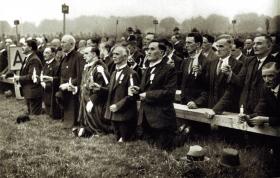The Catholic Church: inimical to democratic freedoms
Published in 20th-century / Contemporary History, Features, Features, Issue 5 (Sep/Oct 2008), Volume 16
Members of the Dáil and Senate at the Eucharistic Congress, 1932—such images reinforced Protestant/unionist perceptions of a southern state dominated by the Roman Catholic Church. (Central Press)
I saw the Protestant Reformation as centrally about civil and religious freedom—the right to read the Bible in one’s own language; to approach God directly with neither priest nor pastor; to interpret the Bible and to assess religious and other issues for oneself. The Catholic Church in contrast was a powerful, wealthy, hierarchical, worldwide institution that interfered in politics so that even a vote for Dom Mintoff, Malta’s socialist leader, was deemed a mortal sin. The Church would restrict democratic freedoms when and where it could, and its influence seemed to explain what seemed like greater poverty among Falls Road Catholics. The Irish Republic was an impoverished, alien and backward region where Gospel preachers were harassed by the Legion of Mary and Protestants kept their heads down.
















